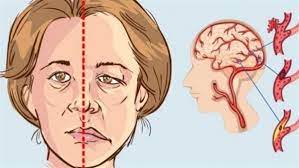
ADVERTISEMENT
5 Everyday Foods You Commonly Consume That Could Lead to a Stroke
Introduction
Strokes are often considered sudden, unpredictable events, but did you know that your everyday food choices could be influencing your stroke risk? In this article, we will delve into the connection between your diet and the potential for strokes. Understanding the impact of common foods on your cardiovascular health is crucial for making informed choices that can protect you from this serious health issue.
Salt: The Silent Culprit
Many of us reach for the salt shaker without giving it a second thought. However, excessive salt intake can lead to hypertension, a significant risk factor for strokes. Dive into the hidden dangers of salt and learn how to reduce your intake for a healthier heart.
Processed Foods: A Hidden Threat
Processed foods have become a staple in many diets due to their convenience. Uncover the hidden dangers lurking in these seemingly harmless products and discover how additives can contribute to cardiovascular issues.
Sugary Sweeteners: A Bittersweet Truth
Sugar is everywhere, even in foods we don’t associate with sweetness. Explore the link between sugar consumption and stroke risk, and be surprised by the hidden sugars in common foods.
Saturated Fats: A Heartbreaker
Saturated fats, often found in our favorite comfort foods, play a role in increasing stroke risk. Learn about the sources of saturated fats in your diet and discover healthier alternatives to protect your heart.
Trans Fats: The Sneaky Enemy
Trans fats are notorious for their harmful effects on cardiovascular health. Identify common sources of trans fats in your everyday meals and take steps to eliminate or reduce them for a healthier lifestyle.
Unhealthy Cooking Oils: Frying Away Your Health
Your choice of cooking oil matters more than you think. Examine the impact of certain cooking oils on stroke risk and find healthier alternatives that won’t compromise your health.
Lack of Fiber: Ignored but Crucial
Fiber is often overlooked but plays a crucial role in preventing strokes. Discover the importance of dietary fiber and explore foods rich in fiber that you can easily incorporate into your daily meals.
Red Meat: A Double-Edged Sword
The relationship between red meat consumption and stroke risk might surprise you. Learn about moderation and explore alternative protein sources for a diet that supports heart health.
Alcohol: The Fine Line Between Moderation and Risk
While moderate alcohol consumption may have some benefits, excessive drinking can elevate your stroke risk. Navigate the fine line between moderation and risk with guidelines for a healthier relationship with alcohol.
The Power of Antioxidants: Shielding Against Stroke
Antioxidants act as a protective shield against strokes. Uncover the foods rich in these powerful compounds and learn how to incorporate them into your diet for enhanced cardiovascular health.
Hydration: The Overlooked Factor
Staying hydrated is more than just quenching your thirst. Understand the importance of hydration in stroke prevention and discover the best fluids to maintain optimal health.
Exercise: A Key Player in Stroke Prevention
Physical activity is a key player in maintaining a healthy cardiovascular system. Explore the relationship between exercise and stroke prevention, and find simple exercises to incorporate into your routine.
Mindful Eating: A Holistic Approach
Mindful eating goes beyond choosing the right foods. Learn about the importance of mindfulness in preventing strokes and gain practical tips for cultivating mindful eating habits.
Conclusion
ADVERTISEMENT
In conclusion, your daily food choices have a significant impact on your stroke risk. By being mindful of your diet, reducing salt and sugar intake, choosing healthier fats, and incorporating antioxidant-rich foods, you can take proactive steps toward stroke prevention. Combine these dietary changes with regular exercise and mindful eating for a holistic approach to cardiovascular health.
Thankyou…very interesting sure it is more than helpful..Will share with others
You gavr hints but didn’t Specify what foods to eat.What foods not to eat?What oils to cook with but oils?Not to cook with
Thank u for the information I’m very lucky when it comes to food I eat a lot of fruit and veg and also fish my family jeans r good we all die old
Thank you Mel so much for looking out for us. WE Love ❤️ You Or At least I Do But then I Have Loved You Since Mad Max .
Your daily advisory are greatly appreciated! I am finding them informative and helpful. Keep sending them!
Half of this is bullshit
I follow a Carnivore diet and many like me are in their best shape and health than ever. Im 63 and all my joint pain disapeer I finelly reach my health weight all by only eating meet with 80% red meet.
Oxalate in plants will make you sick.
Meat does not make you sick as long as you eat only meat. Stop eating all those crapy food full of carbs and Oxalate
Thank You !, spot on !, Best of the Best !, all of your articles are very truthful and thoughtful, Please keep up the Great Work…
Dear Mel,
thank you for this Information. I know about this.
My main problen are oils I am working with and a dentist who put me wrong dental Material in my teeth. It is very expensive to heal this problem. I lost my hole money and my house to get my health back. But it is a endless fight.
With best wishes
Gerd Höht
Never gave a list
Thank you for all the warning signs, I have been eating healthier since June last year and I have lost 4 stones. I am on Herbalife. Reason being my mam and her sister had Strokes. I definitely don’t to have one.
Mulțumiri!! In familia mea au fost persoane care au avut AVC. Prezentarea dumneavoastră este benefică pentru o mulțime de persoane.